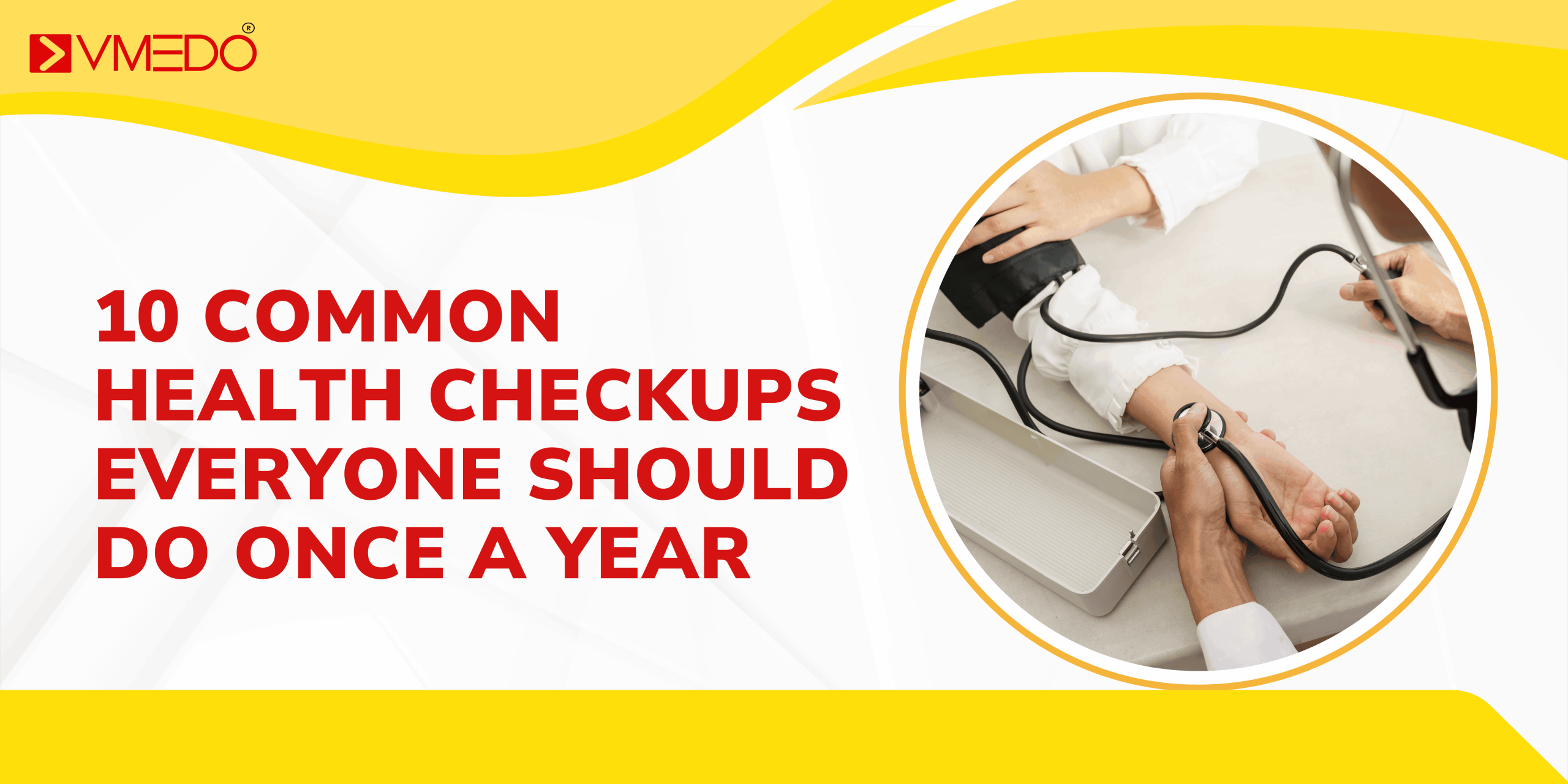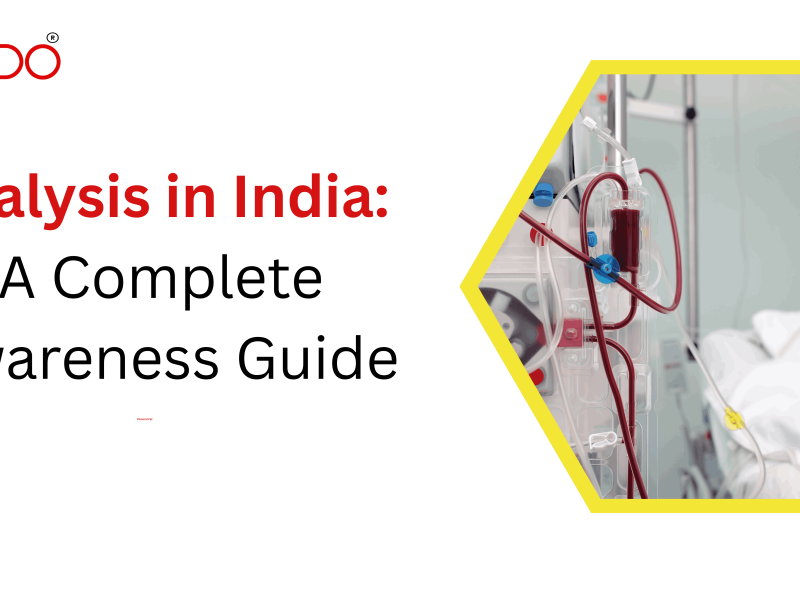Taking charge of your health goes beyond treating illnesses—it’s about preventing them before they start. That’s where 10 common health checkups everyone should do once a year become vital. Many serious health conditions such as diabetes, hypertension, heart disease, and even certain cancers often progress silently without showing early symptoms. By undergoing regular annual checkups, you can detect these problems at an early stage, reduce complications, and make informed decisions about your health.
Regular screenings not only provide a snapshot of your current health but also highlight areas that need attention, empowering you to take preventive steps for a healthier future. From simple blood tests to advanced imaging, these checkups act as a safety net, catching health issues before they escalate.
At VMEDO, we simplify this process by offering health checkups at home, ensuring comfort, convenience, and reliability. Our mission is to help individuals and families stay a step ahead in their healthcare journey with timely screenings and accurate results—because your health deserves priority.
Full Body Health Checkup
What It Includes
A comprehensive full-body checkup is designed to give an overview of your health status. It typically involves:
-
Complete blood count (CBC)
-
Blood sugar levels (fasting & postprandial)
-
Lipid profile (cholesterol levels)
Why It’s Important
A full-body checkup provides a baseline of your health and helps identify early signs of common conditions such as diabetes, thyroid dysfunction, anemia, or liver issues. Regular monitoring helps track changes over time, making it easier to intervene early.
Blood Pressure Screening
What It Includes
Blood pressure measurement is a quick, painless test that records systolic and diastolic pressure levels.
Why It’s Important
High blood pressure (hypertension) is often called the “silent killer” because it usually has no symptoms but significantly increases the risk of heart disease, kidney failure, and stroke. Annual screenings help detect abnormalities early, allowing timely lifestyle or medical interventions.
Blood Sugar Test
What It Includes
-
Fasting blood sugar (FBS)
-
Postprandial blood sugar (PPBS)
-
HbA1c (average sugar levels over the past 3 months)
Why It’s Important
With rising cases of diabetes worldwide, especially in India, annual screening is essential. Detecting high sugar levels early helps prevent complications like nerve damage, kidney disease, and vision loss. Even if you feel healthy, regular testing is important, especially if you have a family history of diabetes.
Lipid Profile (Cholesterol Test)
What It Includes
A lipid profile checks for:
-
Total cholesterol
-
LDL (“bad” cholesterol)
-
HDL (“good” cholesterol)
-
Triglycerides
Why It’s Important
High cholesterol levels can silently clog arteries, leading to heart attack and stroke. Regular monitoring helps in adopting preventive measures such as diet modification, exercise, or medication if required.
Complete Blood Count (CBC)
What It Includes
A CBC measures red blood cells, white blood cells, hemoglobin, hematocrit, and platelets.
Why It’s Important
It helps detect anemia, infections, immune disorders, and even early signs of blood cancers. For people with fatigue, recurrent infections, or unexplained weakness, this test provides valuable insights.
Kidney Function Test (KFT)
What It Includes
-
Serum creatinine
-
Blood urea nitrogen (BUN)
-
Electrolytes (sodium, potassium, calcium)
Why It’s Important
The kidneys filter waste and maintain electrolyte balance. Early kidney disease often shows no symptoms until significant damage occurs. Annual testing ensures proper monitoring, especially for individuals with hypertension, diabetes, or a history of kidney issues.
Liver Function Test (LFT)
What It Includes
-
Bilirubin levels
-
ALT, AST, ALP (liver enzymes)
-
Albumin and total protein
Why It’s Important
The liver is vital for digestion, metabolism, and detoxification. Liver diseases such as fatty liver, hepatitis, and cirrhosis often progress silently. Regular liver tests detect early abnormalities, especially in individuals who consume alcohol, are overweight, or take regular medications.
Cancer Screenings
What It Includes
Screenings vary depending on age, gender, and family history:
-
Men: Prostate-specific antigen (PSA) test for prostate cancer.
-
Women: Pap smear and HPV test for cervical cancer, mammogram for breast cancer.
-
Both: Colonoscopy for colorectal cancer (recommended after 45 years).
Why It’s Important
Cancer detected at an early stage is far more treatable than in advanced stages. Annual or age-appropriate cancer screenings are one of the most effective preventive measures.
Eye and Dental Checkup
What It Includes
-
Eye Checkup: Vision test, intraocular pressure (for glaucoma), retina examination.
-
Dental Checkup: Oral examination, gum health assessment, cavity detection.
Why It’s Important
Annual eye exams detect vision changes, cataracts, glaucoma, and diabetic retinopathy. Dental checkups prevent gum disease, tooth decay, and oral infections, which can also impact heart health.
ECG and Heart Health Screening
What It Includes
-
Electrocardiogram (ECG)
-
Echocardiogram (if needed)
-
Stress test (for those with risk factors)
Why It’s Important
Heart disease remains a leading cause of death worldwide. An ECG helps detect arrhythmias, past heart attacks, and abnormal heart function. Annual heart health assessments are especially important for individuals with diabetes, hypertension, high cholesterol, or a family history of cardiac issues.
Additional Recommended Tests Based on Age and Risk Factors
While the above 10 checkups are essential for everyone, additional tests may be recommended:
-
Bone Density Test (DEXA scan): For postmenopausal women and older adults at risk of osteoporosis.
-
Thyroid Function Test: For individuals with weight changes, fatigue, or family history.
-
Vitamin D & B12 Tests: Deficiencies are increasingly common and impact energy, immunity, and bone health.
Benefits of Annual Health Checkups
-
Early Detection of Diseases – Catching conditions like diabetes, cancer, or heart disease early can save lives.
-
Better Disease Management – Regular monitoring ensures better control of chronic illnesses.
-
Preventive Approach – Helps in adopting lifestyle changes before diseases progress.
-
Peace of Mind – Knowing your health status reduces anxiety and promotes mental well-being.
Conclusion
Prioritizing preventive healthcare is one of the most effective ways to safeguard your long-term wellbeing. These 10 common health checkups everyone should do once a year serve as an early warning system, helping detect potential health risks before they develop into serious complications. Regular screenings not only protect you from unexpected medical emergencies but also give you peace of mind and a roadmap to healthier living.
However, we understand that busy schedules and hospital visits often make people postpone their checkups. That’s why at VMEDO, we bring healthcare to your doorstep. From routine blood tests and ECGs to complete health packages, our trusted medical professionals ensure that you and your family receive timely, convenient, and reliable care—without stepping out of your home.
Taking a proactive step today can make all the difference tomorrow. Book your annual health checkup with VMEDO and invest in what truly matters—your health.



